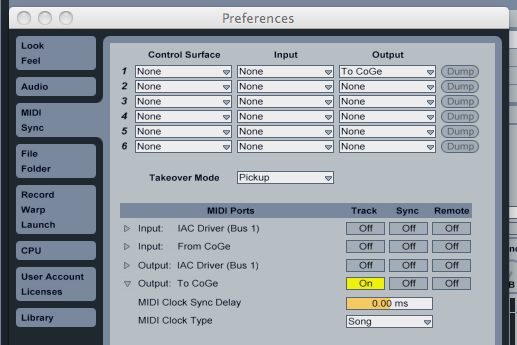



This is also useful if you are sharing sessions with a friend. This will essentially render the midi or audio and all of the plugins on that channel. A workaround to this is to “FREEZE” your tracks. When dealing with large sessions and using lots of processing you will find your CPU gets maxed out. When dealing with Midi or Audio you will inherently end up using EQ’s Compressor’s and other effects to get your mix to sit right. If you are using all Ableton plugins then definitely go with 64bit. The only issue with 64bit is that it tends to not work with some 3rd party plugins. 64bit is the way to go for sure, with 64bit it can utilize somewhere around 1000GB depending on what chip and speed it runs at.
ABLETON CLIP MANAGER FULL
Having 8gb of RAM will at least let you use your computers full potential without having any issues from other apps that may keep RAM on hold. If you are using a 32bit system it can only utilize 4GB of RAM. I also suggest having at least 8gb of RAM ready to go for your Ableton computer. This is so they can be quickly auditioned. Any audio files, mixes, or movies will be stored by your computer in it’s RAM. I suggest not storing any files on your desktop either. The performance of an SSD versus a typical Hard Drive is beyond the scope of this blog article but for exact specs here is a link. You can setup your computer with a small SSD (128GB) and a very large HD for backups and to store regular files on. You will be stunned by how fast Ableton runs when loaded from an SSD. I recommend using an SSD for your applications and sample libraries. SSD’s will start up literally instantaneously and since they have no moving parts the read and write time is remarkably faster. If you are fortunate enough to have an SSD in your computer then you will have a lot less problems with your sessions. I had a large session that froze like this one time and it could never be opened again because the RAM could not load the session properly. Try sticking with 44100, if you are having computer issues.īe sure to store backups of your sessions. Be careful to pay attention to the disk usage when doing this to not get an “Out of Memory” message.Īlso you can try to use a lower “Sample Rate” for your sessions. To avoid this you can select “RAM” button in the Sample box. The overload will be indicated by the orange “D” icon in the top right of the screen.

If you are experiencing dropouts in audio or crackles during playback this is a Disc Overload error. You will want to make sure that “Multi Core” Processor support is enabled if your computer has multiple processors. The next thing you will want to do is visit the CPU tab. If you use a higher buffer size during recording Ableton will actually place the Audio in the session with the latency causing your audio to be out of time. Try 128 or 64 to keep your audio from having latency when recorded. If you are recording audio you will need to set your buffer to a lower setting. Typically 256 or 512 are what I like to use as my buffer size. Next we will cover the “Latency” section and “Buffer” size.
ABLETON CLIP MANAGER FREE
Try using 44100k instead and this will free up a lot of CPU. I prefer to do everything at 96k and 24Bit, However, this will gobble up your CPU power very quickly. Ableton will see this as active if not de-selected and this can affect the audio processing power. You will want to turn off any “Input” or “Output” channels that are on in your “Channel Configuration”. Once you are in your Ableton Live preferences select your “Audio” Tab. Here are a few tips that will help you get your sessions and computer fine tuned and ready to rock. In the days of digital audio production we have a whole new set of problems to deal with. #Tips 5 Easy Ways to Maximize Performance in Ableton Live


 0 kommentar(er)
0 kommentar(er)
